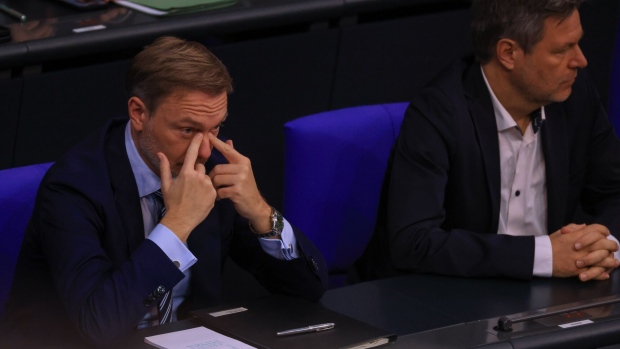Feb 2, 2024
Germany’s Battered Coalition Is Heading for Next Budget Disaster
, Bloomberg News

(Bloomberg) -- Germany’s parliament passed a hard-fought budget for 2024 on Friday, but that will probably offer little respite in what has become a protracted national argument about money.
The bill settles the most pressing dispute sparked by a legal ruling in mid-November on government borrowing. While that’s been the toughest test so far for Chancellor Olaf Scholz’s coalition, an even more daunting battle looms for next year’s budget.
The problem facing the three-party alliance is a gap of roughly €20 billion ($21.7 billion) for the 2025 finance plan, according to people familiar with the calculations. Tackling this will require compromise between political partners who just spent months struggling to agree in private against a backdrop of street protests in public.
That stand-off illustrates just how far a constitutional court ruling that cast doubt on the use of off-balance sheet funding pulled the rug from under Scholz’s government. It meant huge spending commitments underpinning the coalition deal were suddenly constrained by a borrowing limit that parties reckoned they had bypassed.
The budget agreed for this year — passed with coalition votes in the Bundestag — returns Germany to that constitutional brake on debt that had been suspended since 2020: first because of the pandemic, then amid the fallout of Russia’s attack on Ukraine.
The achievement of that accord has cost the government dearly. The budget crisis has further dented the popularity of Finance Minister Christian Lindner’s liberal Free Democrats, Scholz’s Social Democrats and Robert Habeck’s Greens, beyond a loss in support they already suffered amid constant infighting of the past year.
It took more than a month to reach the new deal. Among the outcome of their negotiations were cuts to social benefits and subsidies, which mainly targeted the agricultural sector and led to farmers taking to the streets for weeks.
Joining them were thousands of other frustrated citizens, as well representatives of the far-right AfD party, a political force threatening to make further gains in elections this year for the European Parliament and in state votes taking place in its eastern heartlands.
The compromise that Scholz, Lindner and Habeck achieved for this year required a retreat on some of the budget cuts for farmers and the draw-down of a reserve of more than €6 billion.
But with the bad blood created from that brawl, lawmakers in Berlin are now at a loss to envisage how the coalition will proceed with the 2025 finance plan.
It won’t be possible to reach agreement on that without making people feel the pain, said a senior official, who spoke on condition of anonymity because discussions remain private.
Given tax increases are a red line for Lindner’s FDP, cuts in spending and subsidies are the only options. Another sticking point is the need to modernize Germany’s armed forces and comply with the NATO defense-spending guideline of at least 2% of output.
The more sustainable solution of reforming the straitjacket on borrowing isn’t politically viable, requiring a two-thirds majority in parliament. Friedrich Merz, leader of Germany’s biggest opposition party, the conservative CDU, has already ruled that out. The FDP is also against it.
With attention now turning to the new round of budget talks, the government’s panel of independent economic advisers weighed in this week with a set of proposals to try to break the impasse. These contain three main elements:
- Introducing a transitional phase in the years immediately after an emergency suspension of the debt brake, during which a structural deficit above the normal limit would be permissible, but must be reduced annually
- Making the limit for the annual structural deficit dependent on the debt ratio, and raising it when that’s low
- Making the cyclical adjustment less susceptible to revisions to enable a more adequate cyclical fiscal policy
The plan “increases the flexibility of fiscal policy,” according to Monika Schnitzer, a professor of comparative economics at the Ludwig-Maximilians-University Munich, who chairs the panel.
“It enables forward-looking public spending and regulates the transition after an emergency without undermining the sustainability of public finances,” she said.
--With assistance from Iain Rogers.
(Updates with result of vote from first paragraph.)
©2024 Bloomberg L.P.








